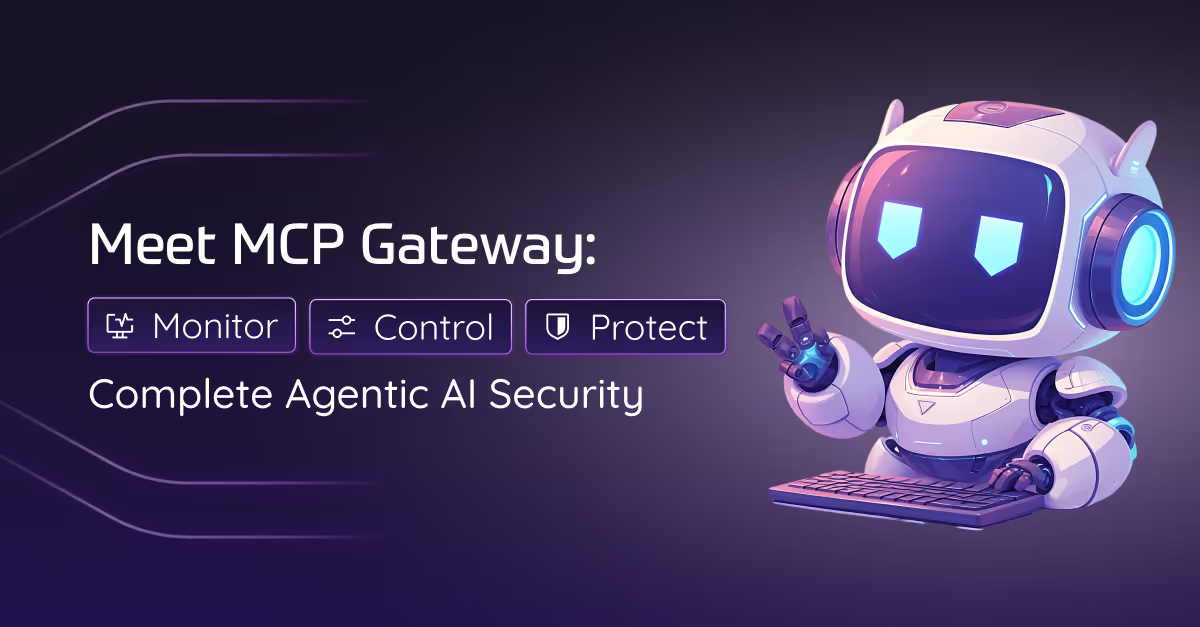If you'd asked us a few months ago how fast the agentic AI systems landscape would grow, we might have answered with cautious optimism and skepticism.
Another paradigm shift? Another new acronym? Early hype aside, reality caught up fast, and now it's everywhere.
In just weeks, agentic AI system development shifted from a research topic to a top conversation with our customers.
The Model Context Protocol (MCP) has gone from buzzword to backbone of next-gen artificial intelligence-powered workflows. Now, practically anyone in a company can connect any AI agent to any internal resource: just like plugging a USB-C cable into any device, even without being especially tech-savvy.
This isn't just about models that think; it's now about models that do. AI is actively integrating with business-critical tools, automating processes, editing files, and most importantly, executing real commands that can directly impact your operations.
With all this power comes unprecedented risk. Organizations now face cybersecurity challenges that traditional tools can't even detect or control. We're hearing it daily from customers: What if the AI tools go off-script? What if someone exploits these new AI capability features? The concern isn't theoretical anymore.
MCP Security matters, and it’s timely
Just last month, over 13,000 MCP servers were made publicly available on GitHub. That’s 13,000 new channels for autonomous agents to not just observe, but to act: granted “hands-on” access to your systems and employees’ computers (even to mine bitcoin!), your sensitive information, and in many cases, your most business-critical operations. And like Office macros in the early days of digital transformation, MCPs are powerful but risky: often enabled by default, frequently unauthenticated, rarely supervised.

While this hands-off approach accelerates innovation, it also introduces serious security blind spots. AI agents can now operate autonomously, interacting with sensitive systems, often without any human oversight. This exposes organizations to emerging AI threats like prompt injection, tool poisoning, privilege misuse, and unauthorized access through “shadow” MCPs, which are already being exploited.
We’ve seen that traditional security operation measures at the network or browser level are no longer sufficient, especially once MCP clients are installed directly on user endpoints. That’s why we’re advancing Prompt Security’s capabilities: to equip organizations with the control, visibility, and protection they need in the era of securing Agentic AI.
Introducing MCP Gateway: Real-Time, Endpoint-Level Agentic AI Security
We're excited to announce Prompt Security’s solution for Agentic AI Security, launching with three major advancements:
1. MCP Gateway
Achieve full visibility and control over every MCP server authorized by your organization.
- Endpoint-level monitoring and control: Our agent-based approach delivers real-time protection directly on user devices, monitoring every interaction between MCP servers and employees without any action required from them.
- Complete visibility: Instantly identify all MCP usage across your environment, from approved integrations to shadow (unauthorized) MCPs you may not know exist.
- Automatic enforcement: Block unauthorized actions, stop malicious prompts, and enforce security policies on every AI-powered tool in use.
- Audit of all interactions: Keep an audit trail of all interactions between MCP servers and clients, of both prompts and responses.

2. MCP Risk Assessment
Deeply analyze and continuously assess the risk the MCP technology sprawls in your organization.
- Code-level inspection: The solution continuously analyzes the underlying codebase of MCP servers using multiple static and dynamic analysis tools, to uncover hidden vulnerabilities, misconfigurations, authentication gaps, or risky metadata as part of comprehensive vulnerability management.
- Dynamic risk scoring: Every MCP server receives a continuously updated risk score, empowering you to make informed AI decisions about which AI integrations to allow, block, or review. Each score reflects a blend of security, quality, maintenance, and compliance signals drawn directly from the MCP server’s source code and configuration. These include signs of vulnerability exposure, insecure defaults, lack of updates, and gaps in governance best practices. The scoring model is dynamic, adapting as the MCP tools evolve, new cyber threat patterns emerge, or configurations drift, giving you a near real-time view of your organization's exposure to the MCP tools-related threat landscape.
Whether you're dealing with officially sanctioned MCPs or ones spun up by individuals or teams, our risk management engine helps you prioritize based on measured risk, not guesswork. This enables security operations teams to pinpoint the riskiest areas and collaborate with developers on strengthening controls where they matter most.

3. Protecting MCP Interactions with your Homegrown AI Applications
OpenAI recently expanded support for remote MCP servers in its Responses API, following the earlier integration of MCP in the Agents SDK. With this update, developers can now connect OpenAI models to tools hosted on any MCP server with just a few lines of code, making the integration process faster and easier than ever.
However, this new flexibility also introduces significant cloud security risks. With a single line of code, any AI application can now call out to a wide array of MCP servers, dramatically increasing the potential attack surface. A user could, for example, prompt the AI to access an MCP server that performs sensitive operations, such as interacting with databases, executing commands, or managing SaaS platforms. If not properly monitored, this could allow malicious actors to exploit vulnerabilities, expose sensitive data or trigger destructive actions.
That’s where our solution comes in. Prompt Security’s AI gateway can automatically redirect MCP server requests through our own MCP gateway, which acts as a secure reverse proxy and inspection point. This enables us to thoroughly inspect and moderate every interaction between OpenAI and any MCP server,effectively monitoring AI agent behavior in real-time. Our gateway can block access to risky tools, filter out malicious parameters, and even sanitize or modify responses, both for requests going to MCP servers and data coming back from them.
.avif)
Put simply, even if a company’s AI app is built on OpenAI and uses MCP servers for powerful automation, users (or threat actor entities) could potentially abuse those capabilities through prompt injection or malicious requests. Our gateways are designed to close the loop on these threats, ensuring that every argument, action, and response between the LLM and connected tools is continuously protected, no matter where the tools are hosted. This comprehensive approach strengthens your overall security posture against malicious AI agents.
What sets Prompt Security apart?
Prompt Security delivers the most comprehensive solution for Agentic AI Security by combining endpoint-level enforcement with deep risk analysis. Our lightweight agent enables direct, device-level protection that traditional network solutions can't match, providing essential threat detection capabilities. We dynamically assess risk for over 13,000 MCP servers on GitHub, providing up-to-date scoring that empowers informed decisions about AI integrations within the proper security context. Additionally, our technology offers deep inspection of every interaction between users or homegrown applications and MCP servers, ensuring that even subtle or emerging threats are detected and controlled by human analysts when necessary.
The Future is Here
Agentic AI isn't a distant vision; it's now part of everyday operations. With tools that can take real action across critical systems, the stakes have never been higher. MCP technology is empowering, but without proper oversight and threat intelligence, it can also be dangerously exposed.
Prompt Security's new MCP Gateway and Risk Assessment are built to secure this future: delivering real-time, endpoint-level protection, full visibility into MCP activity, and dynamic risk scoring to understand agent behavior patterns.
The future of AI is here: dynamic, autonomous, and deeply integrated into your systems.
Want to learn more, see a live demo, or schedule an assessment? Book time with the Prompt Security team.


.png)
.png)
.png)




